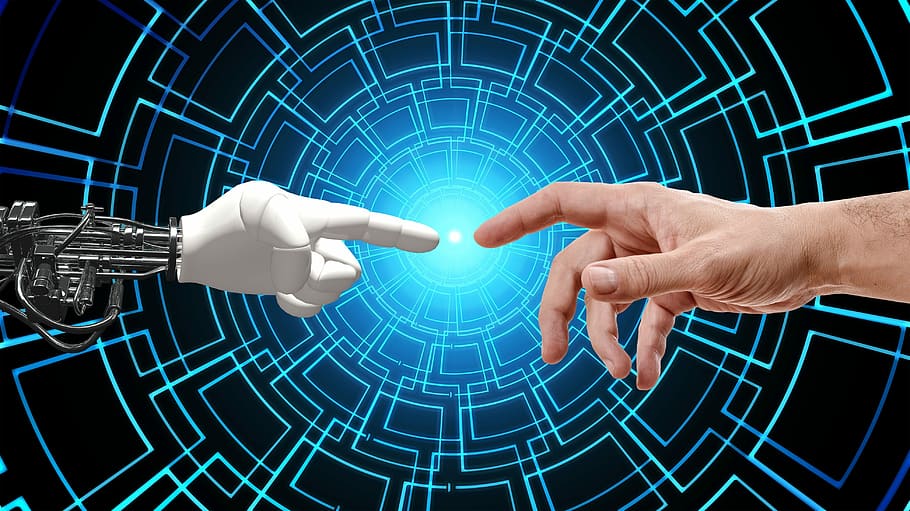© Copyright 2023 Quick Creator - All Rights Reserved
Pushing Boundaries: Exploring Human-AI Collaboration Opportunities and Challenges

Introduction
Human-AI collaboration is the process of combining human intelligence with machine learning algorithms and artificial intelligence systems to achieve a common goal. This concept has been gaining popularity in various industries, as AI technology continues to advance at an unprecedented rate. From healthcare and finance to manufacturing and transportation, companies are increasingly leveraging the power of AI to enhance their decision-making capabilities, streamline processes, and improve overall productivity. As such, integrating AI into daily operations has become essential for businesses looking to remain competitive in today's fast-paced world. However, while there are many benefits associated with human-AI collaboration, it also comes with its own set of challenges that must be addressed if this partnership is going to succeed in the long term. In this blog post, we will explore some of these opportunities and challenges that come with pushing boundaries through human-AI collaboration.
Opportunities and Challenges
Opportunities
Human-AI collaboration presents a plethora of potential opportunities that can lead to more efficient and effective outcomes in various fields. One significant opportunity is the concept of skill complementarity, wherein humans and AI systems work together to achieve a common goal by utilizing their unique strengths. For instance, AI algorithms can process vast amounts of data quickly and accurately, while human experts possess domain-specific knowledge that machines lack. By combining these skills, professionals can make better decisions faster than they would be able to do individually.
Another opportunity that human-AI collaboration presents is the ability to automate repetitive or dangerous tasks that may put humans at risk. This could include anything from monitoring large-scale industrial operations for safety violations to identifying security threats at airports or other public spaces. The use of AI technologies in such situations enables humans to focus on more complex tasks requiring creativity, critical thinking, and decision-making abilities.
Challenges
Despite its numerous benefits, there are several challenges associated with human-AI collaboration as well. Perhaps chief among these challenges is achieving compatibility between human workers and AI systems. To be effective collaborators, both must understand each other's capabilities and limitations thoroughly.
Moreover, developing compatible communication channels requires careful consideration since traditional interfaces used by one group may not necessarily translate well into another setting or system environment where different forms of language automation technology might exist simultaneously like chatbots etcetera.
Additionally, there is also a need for creating an ethical framework around how AI should operate alongside humans so that it does not replace jobs entirely but rather enhances them through skill complementarity approaches while respecting individual rights such as privacy concerns related issues which need addressing too if we want people trust artificial intelligence solutions enough for widespread adoption across industries ranging from healthcare all way up until finance sectors globally without any hiccups along the way before reaching mass market penetration levels desired by many organizations worldwide wanting improved efficiency gains over time achieved via collaborations between man-made intelligent software programs running 24/7 on server farms all over the globe.
Role of Human Expertise and Judgment
Artificial intelligence (AI) technologies have advanced significantly in recent years, but they still lack the ability to replicate human expertise and judgment. Human expertise refers to the knowledge and skills that individuals acquire through education, training, and experience over time. It encompasses a wide range of disciplines such as medicine, law, engineering, and many others. In contrast, human judgment is the process of evaluating information in order to make decisions or form opinions based on personal values and beliefs.
In shaping the future of human-AI collaboration, human expertise plays a crucial role. While AI can process vast amounts of data quickly and accurately, it cannot replace humans' ability to interpret complex situations and apply critical thinking skills. For example, in healthcare settings where AI algorithms are used for diagnosis or treatment recommendations, medical professionals' input is essential for ensuring patient safety by validating results against their own clinical experience.
Similarly important is the role played by human judgment in guiding AI systems toward ethical decision-making processes. Even with robust guidelines programmed into an AI system's algorithms for ethical considerations like fairness or bias reduction when making decisions based on large datasets – there will always be gray areas where subjective interpretation comes into play. Humans bring valuable insights about what constitutes fair outcomes that may not be fully represented within formal rules-based models.
Finally yet importantly - together - we must explore how both our collective expertise can help overcome some limitations posed by current limitations posed by AI technology alone without considering other factors such as regulatory frameworks or biases present within data sets being analyzed; this includes identifying issues related to accuracy rates across different groups/communities impacted differently depending upon demographics including race/ethnicity gender sexual orientation socioeconomic status etc., understanding nuances around language translation which could lead unintended meanings especially with more nuanced concepts like sarcasm humor etc., exploring possibilities for leveraging existing infrastructure from traditional approaches while incorporating new learnings gained via machine learning models so that we do not miss out on best practices just because they have not been formalized into digital workflows yet.
Conclusion
In conclusion, the potential for human-AI collaboration is vast and promising. With AI's ability to process large amounts of data quickly and accurately, coupled with humans' critical thinking skills and creativity, there are numerous opportunities for collaboration in various industries. However, this collaboration also poses challenges such as ethical concerns surrounding AI's decision-making capabilities and potential job displacement. It is crucial that we approach these challenges with caution and consider the long-term impact of our collaborations with AI. As technology continues to evolve rapidly, it is important that we continue to explore ways to push boundaries while ensuring a responsible use of AI in partnership with humans.
